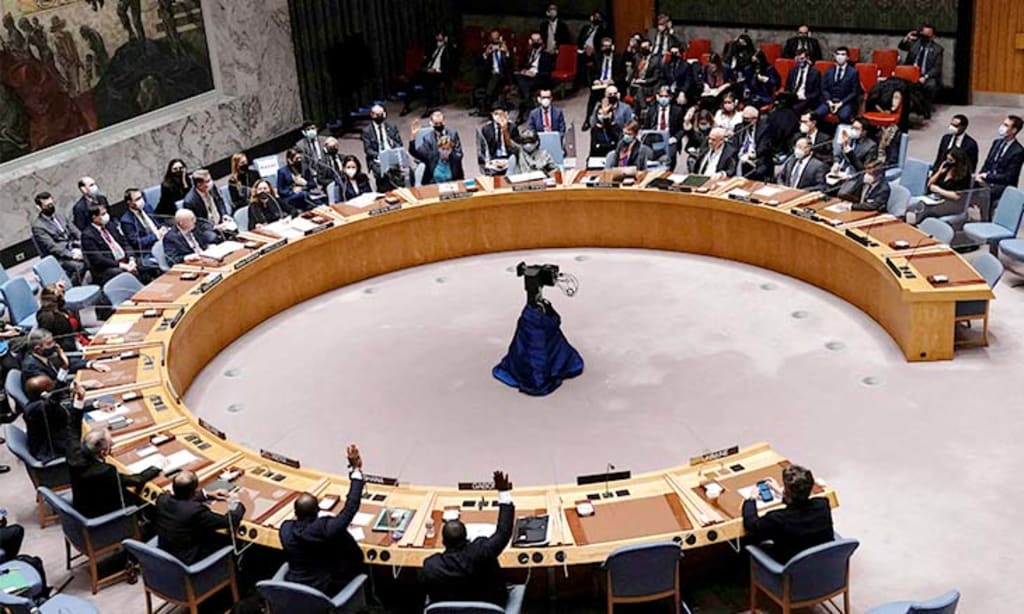
Another crisis that ravages Europe and reminds it of the pain of the two world wars, and ignites many feelings of anxiety and fear of a future that does not seem bright, but the effects of the war raging on the eastern borders of the White Continent will not be confined to this region, but rather its reverberations and frequencies will reach the rest of the world.
It is one of the crises with risks whose extent cannot be predicted yet, but it was reflected in its political and diplomatic dimensions on the UN Security Council, which was unable to pass a resolution condemning the Russian war on Ukraine because both Russia or China have the right of veto to prevent the issuance of any decision that is not in line with their policies .
There are many questions that the observer cannot overcome related to Russia’s motives to target its neighbor, the role of Western policy in creating the conditions that prompted Vladimir Putin to take such a dangerous step, the extent of Russia’s ability to achieve a decisive military or political breakthrough after its unsuccessful experiences in other regions such as Afghanistan, and the extent of the effectiveness Economic sanctions as a deterrent to a large country that possesses natural resources, especially oil and gas, that Europe cannot do without.
But Moscow feels a measure of reassurance about the results of the dangerous adventure, given what it achieved when it seized control of the Crimea peninsula in 2014, which did not result in serious repercussions.
There are facts that clearly impose themselves: the first is that the Russian military targeting of Ukraine was not surprising, but rather was expected for weeks, which negatively affects the credibility of Western countries, which were unable to prevent its occurrence. Second: The Western statements that preceded the invasion may have contributed to encouraging Russia rather than deterring it, because they were not characterized by deterrent force. Rather, the statements of Western leaders focused on economic sanctions only, and it was clear that they were not ready for a military confrontation with Russia. Third: The proposed sanctions are not likely to bring Russia to its knees, especially with America's unwillingness to prevent Russia from benefiting from the international banking system and the "SWIFT" mechanism that facilitates the process of financial exchange between countries. Fourth: European countries do not want to escalate with Russia by stopping importing its oil and gas products, especially in the current circumstances that have witnessed an unprecedented rise in energy prices recently.
Fifth: The West found itself in a battle with Russia that its allies refused to get involved in, so strong positions against Russia were not issued by them. In addition to China, which did not condemn Russia, the positions of most countries in the world were neutral. Saudi Arabia and its Gulf allies refrained from denouncing Russia. As for Pakistan, its Prime Minister, Imran Khan, was exchanging conversations with the Russian President on the same day he ordered military action on Ukraine. Even the European countries themselves were hesitant. Germany announced the suspension of the gas pipeline project with Russia, known as "Gazström 2". The British Prime Minister was satisfied with using rhetoric without active content, which his opponents from the Labor and Liberal Democrat parties considered an indication of the weakness of his position.
These facts do not cancel out other dimensions of the crisis.
The first is that it is the first of this magnitude since World War II, and that its results will greatly affect the military balance in Europe.
Second: Ukraine realized that the West had abandoned it in its hour of need, and its President Zelensky considered himself alone in the battle with a gigantic military force that surpassed his country's military capabilities. While the reality of the crisis is directly related to NATO, because Ukraine wants to join the alliance, while Moscow considers this a threat to its national security, and it is not excluded that he feels the futility of joining the alliance as long as he has proven his inability to take a position that protects it from Russia.
Third: The crisis is expected to cast a shadow on the international balance in its political and military aspects. The UN Security Council is clearly divided against itself, and unable to take effective decisions to contain the war, and this would push the United Nations, under pressure from other countries of the world, to rethink the composition of the Security Council that has continued since the end of World War II, and change the current composition of the Council as well as the veto system followed Currently. On the military level, the Russian move has revived the debate over the military balance between East and West, and that a new military situation may emerge in a not too long time to include other countries such as China, North Korea and Iran. On the economic front, there are features of an alternative project that seeks to break the dominance of the dollar in the global economy, and it is not excluded that the digital process “Bitcoin” will become one of the alternatives to the dollar, in addition to another currency agreed upon by countries with major economies such as China, Russia and India.
Thus, the Ukrainian crisis is likely to turn into a global issue that helps to expedite the search for a new political, military and economic system after the signs of aging began to appear on the system that dominated the world for three quarters of a century. If the fall of the socialist system with the disintegration of the Soviet Union more than thirty years ago has absorbed its effects, what is happening in central Europe may be a key to a giant gateway to global changes. Indeed, Europe itself is no longer able to protect its existence as a coherent political force, especially after Britain's withdrawal from the European Union, and the overlap of its economies with Russia, China and the rest of the world in a way that is difficult to dismantle easily. It is clear that the search for alternatives to energy over the past quarter century did not lead to conclusive results, as oil is still the number one source of energy in the world. If its prices have declined in the last two decades as a result of being influenced by Western propaganda about energy alternatives, oil has recovered and its price doubled in the last six months until the price of a barrel exceeded one hundred dollars. It is certain that the energy crisis will affect the course of the crisis, especially since Westerners are not ready to sacrifice much economically in light of the continued rise in oil and gas prices. The political dimensions will continue to interact with their economic and military dimensions, which the Russian president calculated carefully before he did what he did. Putin bases his positions on historical backgrounds preceded by his predecessors during the Cold War that erupted after World War II. The Soviet Union was not ready to withstand the attempts of rebellion or defection by the member states, so the invasion of Budapest, the capital of Hungary, in 1956, and then the so-called “Prague Spring” came in Czechoslovakia in 1968, and those who sought to rebel at that time were crushed. The memory still recalls the Soviet intervention in Afghanistan, which lasted about ten years after the invasion that took place in 1979 to support the communist regime in Kabul. Regardless of the extent of these interventions, they were troubling developments for the West, which feared nuclear war, especially after the Cuban missile crisis in 1962.
This time, Putin was able to take advantage of the West's conditions, which were not at their best, and announced his categorical rejection of what he considered a policy of military siege on its western borders after the accession of the Eastern European republics after the dissolution of the Soviet Union to the European Union and NATO. Summits were held between the American and Russian presidents to discuss Moscow's concern over its security from the expansion of NATO to the east, until only Ukraine was left outside the alliance, waiting for its inevitable accession.





Comments
There are no comments for this story
Be the first to respond and start the conversation.